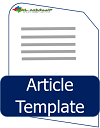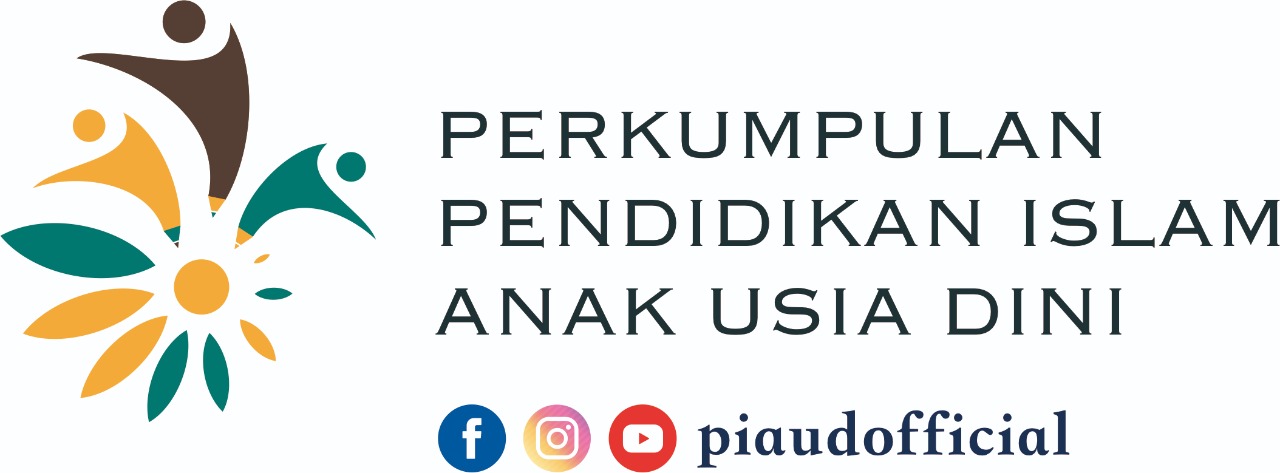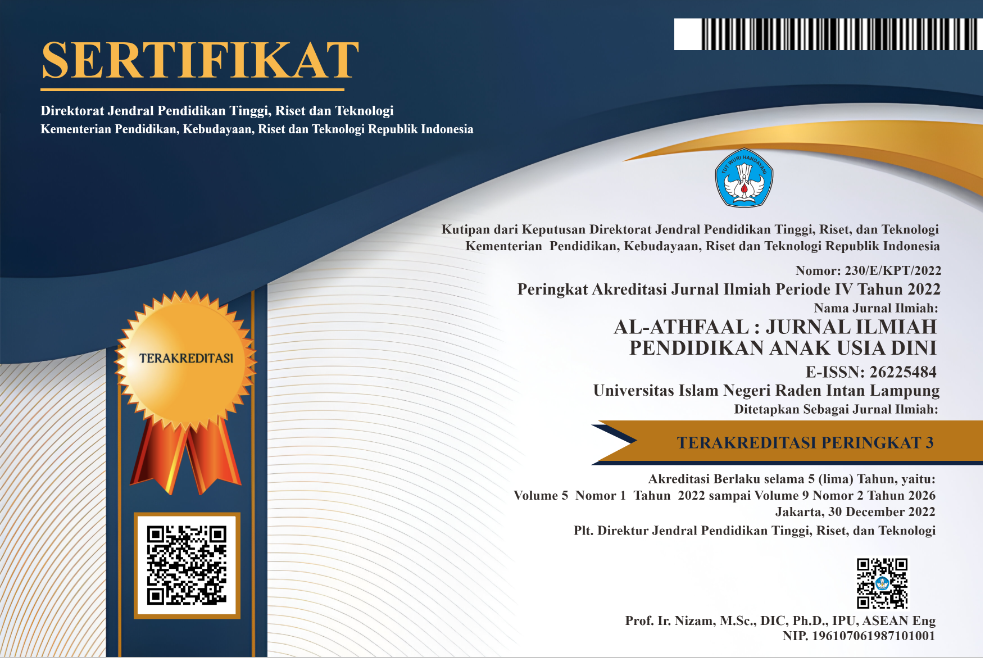Analysis of the implementation of the Montessori method in daycare services for children aged 1-3 years
Abstract
Background : Daycare centers provide early childhood education from morning to evening, serving children from six weeks to school age. They are essential for working parents, offering continuous care and supervision. Many daycare centers struggle to provide effective education and care, highlighting the need for better curriculum designs. The Montessori method, known for its child-centered approach, offers a potential solution.
Aim : To analyze the implementation of the Montessori method in daycare services for children aged one to three years, focusing on curriculum design, execution, and evaluation.
Method : This study uses a literature review method, gathering data from primary and secondary sources. Information was collected, organized, and analyzed to understand the effectiveness of the Montessori method in daycare settings.
Result : The Montessori method emphasizes child-centered learning with teachers as observers and facilitators. Key principles include a prepared environment, direct and concrete learning, respect, observation, and mixed-age groups. For children aged one to three, the curriculum focuses on five areas: eye and hand coordination, music and movement, practical life activities, arts and crafts, and language. Continuous evaluation through observation and personalized reports supports holistic child development.
Conclusion : The Montessori method is effective for daycare services for children aged one to three years. It promotes child development through a structured, child-centered approach, with teachers facilitating independent learning. Continuous evaluation helps in understanding and supporting each child's growth, making the Montessori method a valuable approach for early childhood development in daycare settings.Keywords
Full Text:
PDFReferences
Ahmadpour, N., & Mujembari, A. K. (2015). The impact of Montessori teaching method on IQ levels of 5-year old children. Procedia - Social and Behavioral Sciences, 205. https://doi.org/10.1016/j.sbspro.2015.09.037
Aljabreen, H. (2020). Montessori, Waldorf, and Reggio Emilia: A comparative analysis of alternative models of early childhood education. International Journal of Early Childhood, 52(3), 337–353. https://doi.org/10.1007/s13158-020-00277-1
Brebner, C., Hammond, L., Schaumloffel, N., & Lind, C. (2015). Using relationships as a tool: Early childhood educators’ perspectives of the child–caregiver relationship in a childcare setting. Early Child Development and Care, 185(5), 709–726. https://doi.org/10.1080/03004430.2014.951928
Cheerapan Bhulpat. (2019). Montessori for early childhood development. Journal of Multidisciplinary in Social Sciences.
Chen, A. (2021). Exploration of implementation practices of Montessori education in mainland China. Humanities and Social Sciences Communications, 8(1), 250. https://doi.org/10.1057/s41599-021-00934-3
Dereli İman, E., Danişman, Ş., Akin Demircan, Z., & Yaya, D. (2019). The effect of the Montessori education method on pre-school children’s social competence – behaviour and emotion regulation skills. Early Child Development and Care, 189(9), 1494–1508. https://doi.org/10.1080/03004430.2017.1392943
Dhieni, N.-, Hartati, S., & Wulan, S. (2019). Evaluation of content curriculum in kindergarten. JPUD - Jurnal Pendidikan Usia Dini, 13(1), 72–85. https://doi.org/10.21009/10.21009/JPUD.131.06
Hamer, W., Rachman, T. A., Lisdiana, A., Wardani, W., Karsiwan, K., & Purwasih, A. (2020). Potret full daycare sebagai solusi pengasuhan anak bagi orang tua perkerja. Tapis: Jurnal Penelitian Ilmiah, 4(1), 75. https://doi.org/10.32332/tapis.v4i1.1955
Julita, D. (2021). Islamic Montessori curriculum reconstruction. Indonesian Journal of Islamic Early Childhood Education, 6(1), 1–17. https://doi.org/10.51529/ijiece.v6i1.240
Julita, D., & Susilana, R. (2019). Implementasi kurikulum Montessori bernafaskan Islam pada pendidikan anak usia dini rumah bermain padi di Kota Bandung. Jurnal Penelitian Ilmu Pendidikan, 11(2), 149–162. https://doi.org/10.21831/jpipfip.v11i2.24201
Kiran, I., Macun, B., Argin, Y., & Ulutaş, İ. (2021). Montessori method in early childhood education: A systematic review. Cukurova University Faculty of Education Journal, 50(2), 1154–1183. https://doi.org/10.14812/cuefd.873573
Lillard, A. S., Heise, M. J., Richey, E. M., Tong, X., Hart, A., & Bray, P. M. (2017). Montessori preschool elevates and equalizes child outcomes: A longitudinal study. Frontiers in Psychology, 8. https://doi.org/10.3389/fpsyg.2017.01783
Maria Montessori. (1912). The Montessori method (Second Edition). Frederick A. Stokes Company.
Muis, A., & Dewi, L. (2022). Day care management course design based on OBE and PjBL for teacher education of early childhood education program. Inovasi Kurikulum, 18(2), 128–140. https://doi.org/10.17509/jik.v18i2.35713
Ningsih, R. W., & Fahmi, F. (2022). Strategi manajemen pendidikan anak usia dini pada era disrupsi. Hijri, 11(1), 73. https://doi.org/10.30821/hijri.v11i1.11831
Nurul Qamari, I., & Joko Suryono, L. (2017). Peningkatan kualitas layanan dan tata kelola pendidikan anak usia dini Kenanga Panggung Harjo, Sewon, Bantul. Berdikari: Jurnal Inovasi dan Penerapan Ipteks, 5(2). https://doi.org/10.18196/bdr.5226
Paula Polk Lillard. (1972). Montessori: A modern approach. Schocken Books Inc.
Paula Polk Lillard, L. L. Jessen. (2003). Montessori from the start: The child at home, from birth to age three. Schocken.
Raisya Putri Fernanda*1, S. Wahyuni2, H. R. P. S. N. I. L. O. (2023). Analisis penerapan kurikulum dan pembelajaran di Banana Daycare. Hypothesis.
Rasmani, U. E. E., Rahmawati, A., Palupi, W., Jumiatmoko, J., Zuhro, N. S., & Fitrianingtyas, A. (2021). Implementasi manajemen kurikulum pada lembaga pendidikan anak usia dini. International Journal of Community Service Learning, 5(3), 225. https://doi.org/10.23887/ijcsl.v5i3.38216
Rika Purnamasari, I. R. (2022). Implementation of early childhood learning with the Montessori method in TK IT Cendikia Purwakarta. International Journal of Early Childhood Community Learning.
Rita Pranawa, N. S. D. Z. (2019). Evaluasi pelayanan pengasuhan anak taman penitipan anak (TPA) dan taman anak sejahtera (TAS). Komisi Perlindungan Anak Indonesia.
Rizkita, D. (2017). Pengaruh standar kualitas taman penitipan anak (TPA) terhadap motivasi dan kepuasaan orangtua (pengguna) untuk memilih pelayanan TPA yang tepat. Early Childhood: Jurnal Pendidikan, 1(1), 28–43. https://doi.org/10.35568/earlychildhood.v1i1.46
Savitri, I. M. (2020). Montesori for multiple intelligences. PT Bentang Pustaka.
Shivakumara, K., Dhiksha, J., & Nagaraj. (2016). Efficacy of Montessori and traditional method of education on self-concept development of children. International Journal of Educational Policy Research and Review, 3(2).
Simone Davies. (2019). The Montessori toddler. Workman Publishing Co., Inc.
Tim Seldin and Lorna Mcgrath. (2021). Montessori for every family. The Montessori Foundation.
Trianingsih, E., Arsi, A. A., & Artikel, I. (2020). Model pengelolaan pendidikan dan bentuk layanan taman penitipan anak Islam terpadu (TPAIT) Abu Bakar Ash Shidiq Juwana dalam menggantikan peran keluarga. Solidarity: Journal of Education, Society and Culture, 9(1).
Wahyudin Darmalaksana. (2020). Cara menulis proposal penelitian. Fakultas Ushuluddin UIN Sunan Gunung Djati Bandung.
Wahyuningtyas, D. P. (2022). Faktor yang mempengaruhi pengambilan keputusan dalam menitipkan anak di taman penitipan anak (TPA). Zuriah: Jurnal Pendidikan Anak Usia Dini, 3(2), 103. https://doi.org/10.29240/zuriah.v3i2.5737
DOI: http://dx.doi.org/10.24042/00202472204500
Refbacks
- There are currently no refbacks.
Copyright (c) 2024 Al-Athfaal: Jurnal Ilmiah Pendidikan Anak Usia Dini
License URL: https://creativecommons.org/licenses/by-sa/4.0
 Semua publikasi Al-Athfaal: Jurnal Ilmiah Pendidikan Anak Usia Dini [p-ISSN: 2622-5484, e-ISSN: 2622-5182] dilisensikan di bawah Lisensi Internasional Creative Commons Atribusi-BerbagiSerupa 4.0.
Semua publikasi Al-Athfaal: Jurnal Ilmiah Pendidikan Anak Usia Dini [p-ISSN: 2622-5484, e-ISSN: 2622-5182] dilisensikan di bawah Lisensi Internasional Creative Commons Atribusi-BerbagiSerupa 4.0.











